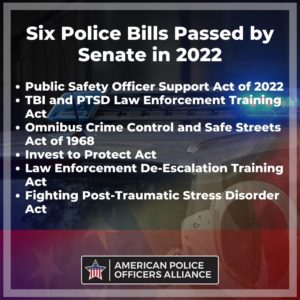With the end of the year arriving, we’d like to look at a selection of bills that have been passed this year by the United States Senate. Each of these bills have begun to, or will, have an impact on the Law Enforcement community. Some have been signed into law by President Biden, while others await action from the House.
The following six bills deal with line of duty death benefits for law enforcement families, additional training for officers dealing with mental health crises, de-escalation training, and additional funding to be used towards recruitment and retention. While not all of these bills have become law, they represent a productive year and remind us that Law Enforcement issues are often at the forefront of the political process and of our ability to influence positive outcomes for America’s police.
Public Safety Officer Support Act of 2022
H.R. 6943, otherwise known as the Public Safety Officer Support Act of 2022 is a major victory for the families of Law Enforcement officers around the country. The bill, introduced by Democrat Representative David J. Trone of Maryland, is an amendment to the Omnibus Crime Control and Safe Streets Act of 1968. H.R. 6943 amends this bill “to authorize public safety officer death benefits to officers suffering from post-traumatic stress disorder or acute stress disorder, and for other purposes.” In the unfortunate event of an officer suicide, families will now be eligible to benefit from “line of duty” death benefits. This bill was passed by the Senate on August 1st and signed into law by President Biden two weeks later.
TBI and PTSD Law Enforcement Training Act
H.R. 2992, or the TBI and PTSD Law Enforcement Training Act, authorizes the framework to provide supplemental training resources for police officers responding to individuals with PTSD and traumatic brain injuries. The bill directs “the Attorney General, acting through the Director of the Bureau of Justice Assistance…(to) solicit best practices regarding techniques to interact with persons who have a traumatic brain injury, an acquired brain injury, or post-traumatic stress disorder…and shall develop crisis intervention training tools for use by first responders.” The bill was introduced by Democrat Representative Bill Pascrell, Jr. It was passed by the Senate on August 1st and signed into lay by President Joe Biden on August 16th.
Omnibus Crime Control and Safe Streets Act

S. 2151 is another proposed amendment to the Omnibus Crime Control and Safe Streets Act of 1968. It was introduced by Senator Gary Peters, a Democrat from Michigan. The amendment would “provide that COPS grant funds may be used for local law enforcement recruits to attend schools or academies if the recruits agree to serve in precincts of law enforcement agencies in their communities.” S. 2151 was passed by the Senate in August and awaits further action.
Invest to Protect Act
S. 3860 would be referred to as the Invest to Protect Act if it becomes law. It is currently sitting in the House after passing through the Senate in August. This bill would greatly benefit funding for Law Enforcement in small communities. It is intended to “establish a grant program to provide assistance to local governments with fewer than 200 law enforcement officers, and for other purposes.” This bill would provide $250m over five years for training, equipment, mental health support, recruitment, and retention in these eligible communities.
Law Enforcement De-Escalation Training Act
S. 4003 was introduced to the Senate by Republican Senator John Cornyn and passed in August. The bill if passed by the House will be known as the Law Enforcement De-Escalation Training Act. The intent of the bill is to “amend the Omnibus Crime Control and Safe Streets Act of 1968 to provide for training on alternatives to use of force, de-escalation, and mental and behavioral health and suicidal crises.”
Fighting Post-Traumatic Stress Disorder Act
S.4007 was introduced by Republican Senator from Iowa, Chuck Grassley and passed in August. If passed by the House and signed into law, it will be known as the Fighting Post-Traumatic Stress Disorder Act. This bill is meant to provide resources to officers who are struggling with mental health disorders. It would “require the Attorney General to propose a program for making treatment for post-traumatic stress disorder and acute stress disorder available to public safety officers, and for other purposes.”










